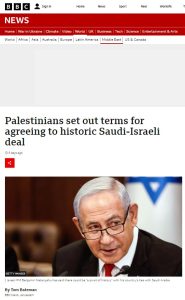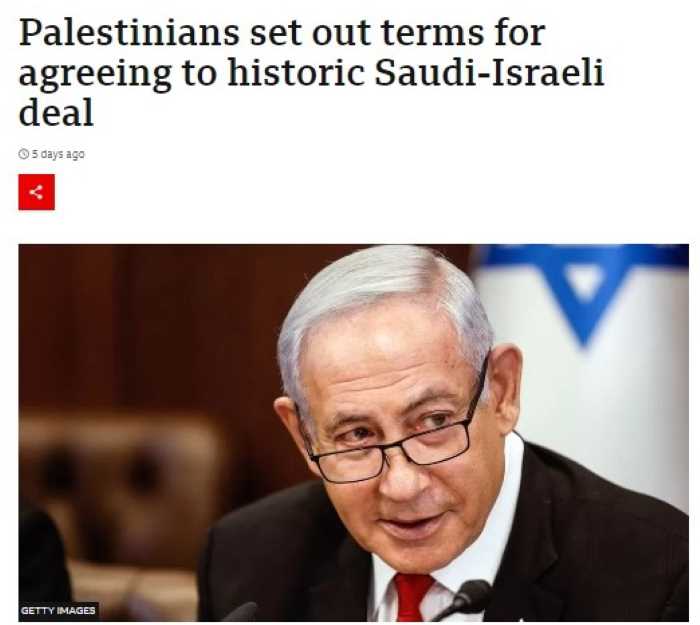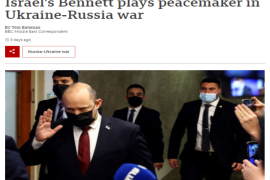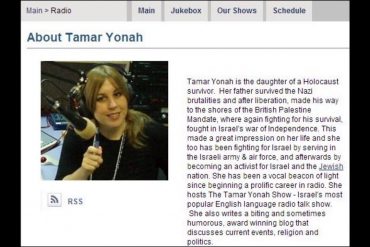Early on September 7th (Israel time) a report by Tom Bateman appeared on the BBC News website’s ‘Middle East’ page under the curious headline ‘Palestinians set out terms for agreeing to historic Saudi-Israeli deal’.
As readers of the report’s opening paragraph discover, contrary to the impression given by that headline the Palestinian Authority is not party to any such currently hypothetical agreement:
“A cash boost of hundreds of millions of dollars and more control of land in the occupied West Bank are among Palestinian demands in the event of a three-way deal involving the US, Saudi Arabia and Israel, the BBC has learned.”
As reported by the Times of Israel several times last month, the Palestinian Authority has apparently elected to change its tactics on the issue of the normalisation of relations between Israel and Arab states.
“In contrast to its boycott of previous normalization efforts, the PA has reportedly decided to become involved in the Saudi-Israel process in an attempt to secure as many deliverables from Israel in the process.”
And:
“A separate Palestinian source familiar with the matter noted that the PA has been careful not to characterize its list as “demands” to avoid being seen as directly complicit in a potential normalization agreement.
The source explained that Ramallah has changed its approach to potential normalization agreements between Israel and its Arab neighbors, no longer boycotting the process altogether or publicly condemning countries that establish diplomatic relations with Israel.
Instead, the PA is seeking to influence the process by separating its various bilateral ties with countries like Saudi Arabia from the normalization file, aiming to bolster both in the process.”
Quoting an unidentified “Palestinian official”, Bateman tells readers that:
“The team of top Palestinian officials in Riyadh – including the two men seen as closest to President Mahmoud Abbas, the PA’s intelligence chief, Majed Faraj, and Hussein al-Sheikh, secretary-general of the Palestine Liberation Organisation – met Saudi national security adviser Musaed al-Aiban on Wednesday, according to a senior Palestinian official familiar with the discussions.
Their list of demands in return for engaging with the American-backed process was set out during a meeting with US Assistant Secretary of State Barbara Leaf last week in Amman. The Palestinian official told the BBC the demands include:
-
- Transferring parts of the West Bank currently under full Israeli control (known as Area C under the 1990s Oslo peace accords) to the governance of the Palestinian Authority
- A “complete cessation” of Israeli settlement growth in the West Bank
- Resuming Saudi financial support to the PA, which slowed from 2016 and stopped completely three years ago, to the tune of around $200m (£160m) per year
- Re-opening the US consulate in Jerusalem – the diplomatic mission to the Palestinians – that was shut down by President Donald Trump
- Resuming US-brokered negotiations between Israel and the Palestinians from where they stopped under then-Secretary of State John Kerry in 2014.”
Reports had already emerged in August concerning an earlier Saudi proposal to renew funding to the PA:
“Saudi Crown Prince Mohammed bin Salman first made the offer to renew aid — frozen completely in 2016 amid graft allegations — when PA President Mahmoud Abbas visited the Gulf kingdom in April, the Wall Street Journal reported Tuesday, citing unnamed Saudi officials. […]
The crown prince, colloquially known as MBS, said the funding would be renewed if Abbas managed to rein in terror groups in the West Bank and restore control over PA territories beyond the Green Line.”
Bateman refrains from reminding readers that the first two “demands” he presents run contrary to the Oslo Accords signed by the Palestinians or that the 2013/14 negotiations “stopped” because the Palestinians announced a reconciliation deal between Fatah and Hamas.
Bateman’s framing of the story quotes one sole named contributor: former PLO legal advisor Diana Buttu, who appears fairly frequently in BBC content despite her long record of promoting falsehoods in the media.
One particularly notable claim from Buttu is uncritically amplified by Bateman:
‘”The Palestinian Authority is now questioning: should we instead be trying to get our demands heard and realised, or should we do what we did in 2020 which was to ignore it? And again it’s a bind – no matter what the Palestinian Authority does on this, it is doomed to fail,” Ms Buttu told the BBC.’ [emphasis added]
The notion that the Palestinian Authority ‘ignored’ the Abraham Accords erases the incendiary statements made at the time by various Palestinian officials and the PA’s promotion of the long-running ‘betrayal’ narrative to which Bateman himself enthusiastically conscripted and which he repeats in this report in a paragraph relating to the Abraham Accords:
“At the time, the PA was frozen out of discussions as it boycotted diplomatic ties with the US in response to President Trump’s Israeli-Palestinian “deal of the century” – a peace plan heavily weighted towards Israel – and his move of the US embassy to Jerusalem. The PA saw the normalisation deals as a “betrayal” of Arab solidarity.”
Bateman fails to clarify that the Palestinian Authority itself had refused to engage with the US administration long before the 2020 publication of the ‘Peace to Prosperity’ plan, including a boycott of the 2019 economic conference in Bahrain. Neither does he provide evidence to support his amplification of the Palestinian claim that the US proposal was “heavily weighted towards Israel”. He does however erase the PA’s refusal to engage with the current US administration on the topic of the Abraham Accords.
Interestingly, Bateman’s framing of the topic makes no mention whatsoever of the Palestinian factions such as Hamas and the Islamic Jihad which totally reject any negotiations or agreements with Israel and are currently challenging PA control of the territory which still remains under its administration.
Unsurprisingly, Bateman’s omissions and distortions of history have the usual – but unhelpful – effect of framing the Palestinian Authority as victims lacking agency rather than a body which has repeatedly and consciously refused to engage both in negotiations with Israel and in wider regional processes.
Related Articles:
REVISITING THE BBC’S FRAMING OF THE 2013/14 ISRAEL-PLO NEGOTIATIONS
BBC CONTINUES ITS PARTIAL PORTRAYAL OF PALESTINIAN REACTIONS TO THE ABRAHAM ACCORDS
DOES BBCSPLAINING OF PALESTINIAN ASPIRATIONS STAND UP TO SCRUTINY?






An uninformed reader could deduce from the BBC’s garbage report that the PA has decided to recognise the nation state of Israel’s right to exist. A more informed reader would conclude that, whilst this may be true, such existence would be just an excuse for more terror attacks.